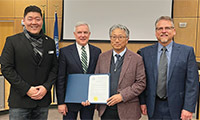In the world of Brazilian music Otto occupies a place as unusual and unlikely as his name. For more than a decade he has been thought of as the guy who combines the textures of electronica with the traditional Africanderived rhythms he first heard growing up in a small town in the interior.
But as Otto prepares for the release of a new CD, his fourth, chillout, drum ‘n’ bass and lounge music seem to be far from his mind. Otto, known on his passport as Otto Maximiliano Pereira de Cordeiro Ferreira, hasn’t exactly renounced his recent past. Yet he makes it clear that he is now seeking a more organic sound.
“I started in electronica because it was easier, something you could do quickly and cheaply, and that made it the ideal path” for a solo artist just beginning his career, he said. “I mean, twothirds of global electronica was already Brazilian music anyway, so I always felt I could decode that and transform it into something else.”
Born in 1968, Otto recalls hearing fife-and-drum bands on the street as a child, remembers the rhythms he tried to pound out as he listened to his parents’ records of samba and Brazilian country music, and marvels at how he was energized by punk and its “do it yourself” credo.
“I’m completely a mixture, of nationalities and ethnicities,” he said. “I’m Dutch and Portuguese combined with Indian and mulatto, precisely the blend that made my country the incredible, inventive place it is.”
At the age of 21, though, Otto headed for Paris, trying to woo a girlfriend. He ended up playing percussion in the band of Raul de Souza, the Brazilian trombonist.
Returning to his home state of Pernambuco in northeast Brazil, Otto quickly became a part of the mangue bit movement, which fused home-grown rhythms like the maracatu, frevo and ciranda with the latest in imported computer and studio technology. He played percussion in both Nacao Zumbi and Mundo Livre S/A, the movement’s two most important bands, before releasing “Samba Pra Burro,” his first solo disc, in 1998. “Samba Pra Burro” was voted record of the year in many Brazilian polls, and also became an international hit on the dance floor and fashion runways.
Though it has been five years since the release of Otto’s last CD, he has been busy. He has become a good friend, for example, of the Turkish-Swedish saxophonist Ilhan Ersahin, leader of the New York trip-hop collective Wax Poetic, whose past collaborators include Norah Jones.
Otto toured for a while as one of two singers in Wax Poetic, performing alongside a Turkish female vocalist, and has also written songs with Mr. Ersahin and spent time with him in Istanbul.
Recently Otto has also been spending time in New York, hanging out at the NuBlu club. There, he said, he has been stimulated by his exposure to American musicians with roots in avantgarde jazz, like the composer and conductor Butch Morris and the drummer Kenny Wollesen.
Otto’s new CD reflects all those changes. It is called “Certa Manha Acordei de Sonhos Intranquilos,” or “One Morning I Awoke From Uneasy Dreams,” which is a paraphrase of the opening sentence of the Franz Kafka novella “Metamorphosis.”
“This record is about having choices and following the path you think is cool,” Otto said. “I’m 41 now and this is surely my most mature work, with a melancholy that mirrors my view of the state of the world. But my music remains receptive to all things. If there’s one lesson I’ve learned, it’s that music is obliged to be open.”
스마터리빙
more [ 건강]
[ 건강]이제 혈관 건강도 챙기자!
[현대해운]우리 눈에 보이지 않기 때문에 혈관 건강을 챙기는 것은 결코 쉽지 않은데요. 여러분은 혈관 건강을 유지하기 위해 어떤 노력을 하시나요?
 [ 건강]
[ 건강]내 몸이 건강해지는 과일궁합
 [ 라이프]
[ 라이프]벌레야 물럿거라! 천연 해충제 만들기
 [ 건강]
[ 건강]혈압 낮추는데 좋은 식품
[현대해운]혈관 건강은 주로 노화가 진행되면서 지켜야 할 문제라고 인식되어 왔습니다. 최근 생활 패턴과 식생활의 변화로 혈관의 노화 진행이 빨라지고
사람·사람들
more
[한인단체 신년 인터뷰] LA 평통 장병우 회장… “본연 역할로 한반도 평화 실질 기여”
민주평화통일자문회의 LA협의회(이하 LA 평통) 장병우 회장은 6일 본보와의 신년 인터뷰에서 붉은 말의 해인 병오년 새해를 맞아 신년 화두로 …

워싱턴주에 첫 한인 시의장
워싱턴주에서 첫 한인 시의회 의장이 탄생했다. 제이슨 문(한국명 문태원) 머킬티오 시의원이 새해 들어 시의장으로 선출되며 또 하나의 중책을 맡…
국회 방문단 대한인국민회 방문
윤후덕·이해식·김한규 의원과 조오섭 국회의장 비서실장 등 10여 명의 한국 국회방문단이 지난 5일 LA를 찾아 로즈데일 묘지와 국민회관 등 미…
[한인단체 신년 인터뷰] 명원식 파바월드 회장… …
“한인 차세대들이 바르게 자랄 수 있는 토대를 만드는 것이 제가 파바월드의 회장으로 존재하는 유일한 이유입니다”한인사회의 대표적 청소년 봉사 …
LA한인회 멘토 프로그램 10일 스티브 강 위원장
LA 한인회(회장 로버트 안)가 한인사회 차세대 인재양성 노력의 하나로 ‘멘토를 만나다’ 프로그램을 정례화해 실시하고 있는 가운데 그 세 번째…
많이 본 기사
- ICE 요원 총격… 시민권자 여성 사… 1
- 초강경 이민단속, 아시아계도 큰 타격 1
- 이주자 텍사스 몰린다 가주는 유입자 최하위
- 케빈 김 주한 미 대사대리 전격 이임
- ‘故안재환과 사별’ 정선희, 재혼 질문에 솔직 답변 “국내에선 의향 없어”
- 가주 등 5개주 연방 아동보육 예산 전격 동결
- 42억 횡령→징역형 집유 받았는데도..황정음 소속사 여전히 미등록
- 치매 예방효과 탁월한 활동은 ‘춤’…… 1
- 경관이 항공기내 성추행 LA행서 신체노출 ‘유죄’
- 41세 구혜선, 석사 논문 합격→조기졸업.. “다음은 박사 필승!”
- LAX 무인열차 6월엔 개통되나
- 트럼프, 각세우던 콜롬비아 대통령과 돌연 통화…백악관 초청도
- 故안성기, 9일(한국시간) 영결식..영정 정우성→설경구·주지훈 운구
- [독자 투고] 땅 끝 마을 파타고니아 여행 유감
- 은퇴준비를 더 이상 미루면 안되는 이유
- 목·어깨·팔이 갑자기 찌릿하다면?… ‘근막동통증후군’ 일수도
- 尹 ‘내란 우두머리’ 재판 내일 종료…사형? 무기징역? 구형 주목
- 니콜 키드먼, 키스 어번과 공식 이혼
- “마두로 체포 환영하는 시민 잡아라”…휴대폰 뒤지고 불심검문도
- 아시아나항공, 14일부터 인천공항 제2터미널 사용
- “숫자 다루는 직업이지만 사람간 소통 · 신뢰가 먼저죠”
- ‘맥립’에 갈비고기 없다 맥도널드 허위광고 소송
- ‘콜록콜록’ …워싱턴 독감환자 폭증
- 당뇨병 환자 발 절단하면 사망률 암보다 높아
- 컴퓨터 전공·로스쿨 졸업생들도‘취업난’극심
- ‘마구잡이 이민단속’ 제한 법안 속속 진전
- “그린란드에 미군 동원 가능”… 트럼프 야욕 드러내
- 美, ‘베네수와 연계’ 러 유조선 나포…미러 신경전 조짐
- [신년 집중기획/ 변모하는 한인타운] K-컬처 중심으로… 면모·체질 ‘업그레이드’ 원년
- [전문가 칼럼] 디지털 시대, 노년의 뇌를 지키는 방법
- 베네수 임시대통령, 美의 석유 관여 옹호… “모두에 이익되게”
- 뉴욕시 ‘숨은 수수료’ 퇴출 나섰다 1
- 사면된 의회 폭동범들 ‘적반하장’… 금전보상 요구까지
- 다운 사이징), 작은 집이 주는 큰 자유!!
- 학교 총기난사범 석방 가능성 논란
- 메디케어 보험 가입 마감 31일까지 연장
- 연말연시 음주운전 단속 379명 체포
- ‘범죄 제국’ 세운 프린스그룹 천즈…10대부터 PC방서 사이버범죄
- 오렌지 상자와 함께하는 2026년
- VA 재무차관에 한인 제임스 허
- LA 한인회, 새해 맞아 양로병원 어르신들께 ‘새배’
- ‘스프링클스 컵케이크’… 전 매장 폐점
- [지평선] 67년생 현역 축구선수 미우라
- “베네수 원유 수천만배럴 미국에 인도”
- “예년보다 빠르고 거세다”
- “기관투자자 단독주택 매입금지 추진”
- 트럼프, 방산기업들에 “배당할 돈으로 생산·유지보수 주력하라”
- 서울고 총동창회 홍희경 전 회장에 감사패
- 뉴욕한인회 음갑선 수석부회장 인준
- ‘AI 강자’ 구글, 시총 2위로 올라서…6년여만에 애플 제쳐
1/5지식톡

-
 미 육군 사관학교 West Poin…
0
미 육군 사관학교 West Poin…
0https://youtu.be/SxD8cEhNV6Q연락처:wpkapca@gmail.comJohn Choi: 714-716-6414West Point 합격증을 받으셨나요?미 육군사관학교 West Point 학부모 모…
-
 ☝️해외에서도 가능한 한국어 선생님…
0
☝️해외에서도 가능한 한국어 선생님…
0이 영상 하나면 충분합니다!♥️상담신청문의♥️☝️ 문의 폭주로 '선착순 상담'만 진행합니다.☎️ : 02-6213-9094✨카카오톡ID : @GOODEDU77 (@골뱅이 꼭 붙여주셔야합니다…
-
 테슬라 자동차 시트커버 장착
0
테슬라 자동차 시트커버 장착
0테슬라 시트커버, 사놓고 아직 못 씌우셨죠?장착이 생각보다 쉽지 않습니다.20년 경력 전문가에게 맡기세요 — 깔끔하고 딱 맞게 장착해드립니다!장착비용:앞좌석: $40뒷좌석: $60앞·뒷좌석 …
-
 식당용 부탄가스
0
식당용 부탄가스
0식당용 부탄가스 홀세일 합니다 로스앤젤레스 다운타운 픽업 가능 안녕 하세요?강아지 & 고양이 모든 애완동물 / 반려동물 식품 & 모든 애완동물/반려동물 관련 제품들 전문적으로 홀세일/취급하는 회사 입니다 100% …
-
 ACSL 국제 컴퓨터 과학 대회, …
0
ACSL 국제 컴퓨터 과학 대회, …
0웹사이트 : www.eduspot.co.kr 카카오톡 상담하기 : https://pf.kakao.com/_BEQWxb블로그 : https://blog.naver.com/eduspotmain안녕하세요, 에듀스팟입니다…
케이타운 1번가
오피니언
 이상희 UC 리버사이드 교수 인류학
이상희 UC 리버사이드 교수 인류학 오렌지 상자와 함께하는 2026년
 오세정 서울대 물리천문학부 명예교수·전 총장
오세정 서울대 물리천문학부 명예교수·전 총장 [오세정 칼럼] 병오년 새해, 한국의 과제
 존 안 / LA 거주
존 안 / LA 거주 [독자 투고] 땅 끝 마을 파타고니아 여행 유감
 이리나 수필가
이리나 수필가 [윌셔에서] 레디 코어(Ready Core)의 해를 맞으며
 이영창 / 한국일보 논설위원
이영창 / 한국일보 논설위원 [지평선] 67년생 현역 축구선수 미우라

[왈가 왈부] “이혜훈 청문회까지 지켜봐야”… 국민 눈높이에 맞나요
 정숙희 논설위원
정숙희 논설위원케네디에 관한 네 개의 이야기
 마크 A. 시쎈 / 워싱턴포스트 칼럼니스트
마크 A. 시쎈 / 워싱턴포스트 칼럼니스트 [마크 A. 시쎈 칼럼] 트럼프의 20가지 업적
 김동찬 시민참여센터 대표
김동찬 시민참여센터 대표 [미국은 지금] 2026년 ‘손님’ 의식 버리고 ‘주인’ 입장을
1/3지사별 뉴스

뉴욕시 ‘숨은 수수료’ 퇴출 나섰다
뉴욕시가 일반 소비 시장에 만연해 있는 ‘숨은 수수료’(Junk fee) 근절에 나섰다. 조란 맘다니 뉴욕시장은 5일 ‘숨은 수수료’ 및 ‘…
‘마구잡이 이민단속’ 제한 법안 속속 진전

VA 재무차관에 한인 제임스 허
30대 중반의 한인 제임스 허 씨(사진)가 버지니아 재무차관(Deputy Secretary of Finance)에 내정됐다. 아비가일 스팬버거…
‘콜록콜록’ …워싱턴 독감환자 폭증

베네수 이어 그린란드…트럼프, 2년차 벽두부터 美우선주의 거친 질주
2026년 새해 벽두부터 도널드 트럼프 대통령의 행보가 심상치 않다.집권 2기 2년차를 맞아 자신과 지지층의 이념이라 할 ‘미국 우선주의’ 구…
중부 캘리포니아 ‘한인 이민사’ 나왔다

오늘 하루 이 창 열지 않음 닫기 



















































.png)


댓글 안에 당신의 성숙함도 담아 주세요.
'오늘의 한마디'는 기사에 대하여 자신의 생각을 말하고 남의 생각을 들으며 서로 다양한 의견을 나누는 공간입니다. 그러나 간혹 불건전한 내용을 올리시는 분들이 계셔서 건전한 인터넷문화 정착을 위해 아래와 같은 운영원칙을 적용합니다.
자체 모니터링을 통해 아래에 해당하는 내용이 포함된 댓글이 발견되면 예고없이 삭제 조치를 하겠습니다.
불건전한 댓글을 올리거나, 이름에 비속어 및 상대방의 불쾌감을 주는 단어를 사용, 유명인 또는 특정 일반인을 사칭하는 경우 이용에 대한 차단 제재를 받을 수 있습니다. 차단될 경우, 일주일간 댓글을 달수 없게 됩니다.
명예훼손, 개인정보 유출, 욕설 등 법률에 위반되는 댓글은 관계 법령에 의거 민형사상 처벌을 받을 수 있으니 이용에 주의를 부탁드립니다.
Close
x